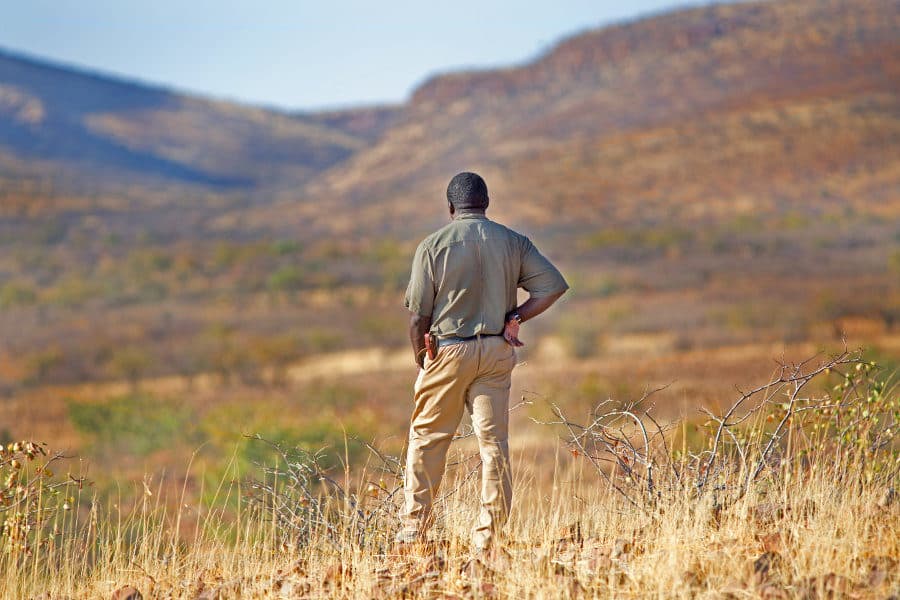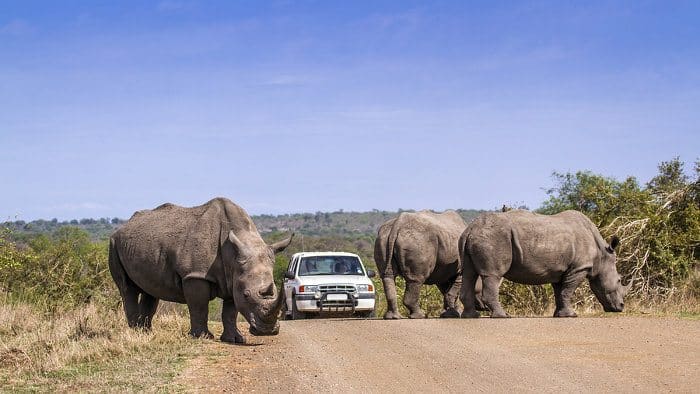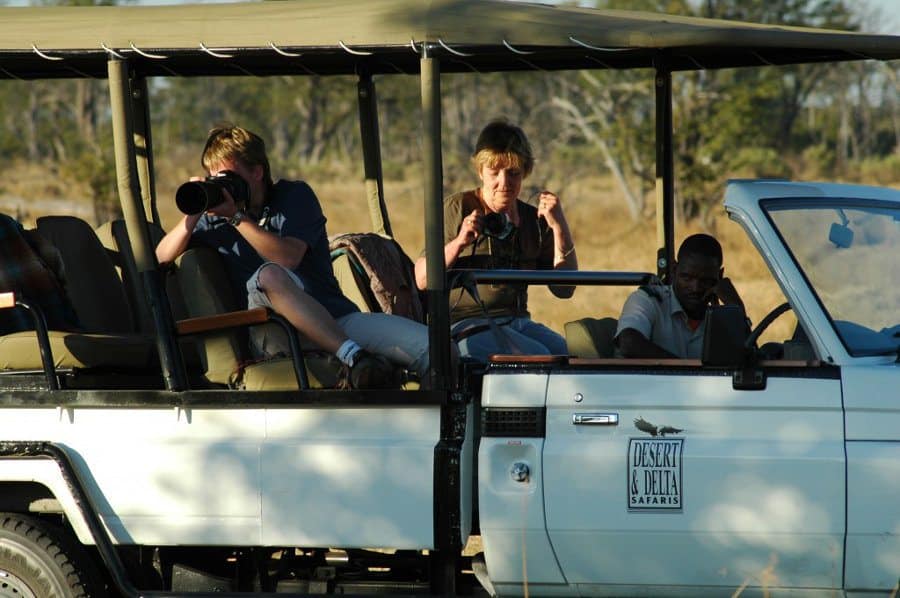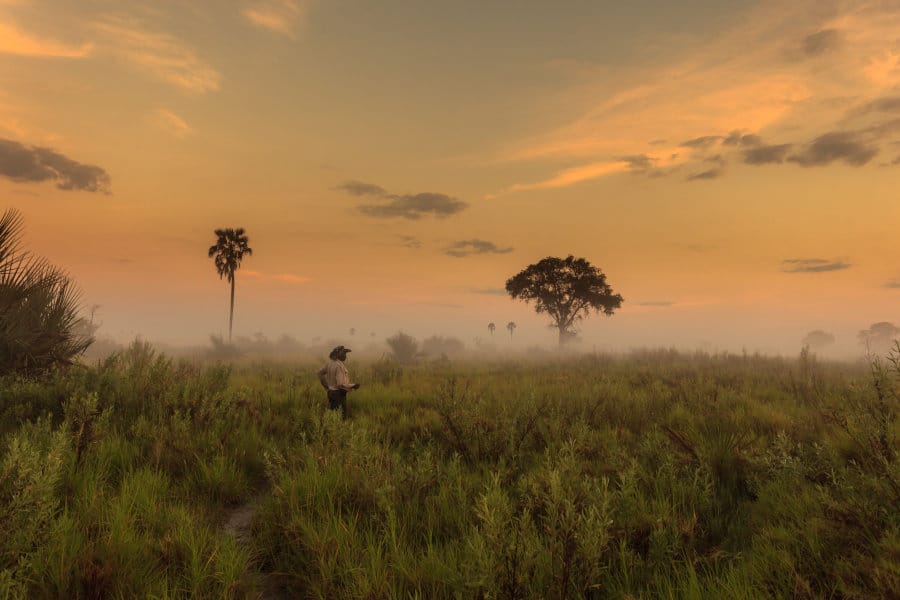Of all the amazing people you will meet in Africa, the humble safari guide will have the biggest impact on your travel experience.
A good safari guide makes the difference between a good safari experience and an unforgettable adventure of a lifetime.
But how do you find a good guide? What questions can you ask? What can you expect from a good and bad safari guide?
For a detailed guide to planning a safari start here. Continue reading to discover how you can find the best safari guide.
Why a Safari Guide is So Important
![]()
Good guides make a difference to all travel experiences. Their historical knowledge helps you learn more about a destination. A cultural sensitivity helps you feel immersed, rather than watching on from the sidelines.
Guides must understand their destinations and be full of ideas, including where to go, what to do, and how to maximise your valuable holiday time. It doesn’t matter where you go in the world, a good guide can help you feel the destination and experience why it is so special.
Let’s not forget that guides are also your travel companions, especially on multi-day tours. You will be traveling with the same person for many hours, so you hope they are entertaining, funny, easy-going and easy to talk to.
A safari guide is all these things and then more.
Safety
A walking tour guide in a European capital city doesn’t need to worry much about your safety. Other than getting run over by a bicycle in Amsterdam, not too much can go wrong. The wilderness is a completely different beast.
Good safari guides need an intimate understanding of animal behaviour, especially the behaviour of potentially dangerous wildlife such as elephants, Cape buffalo and hippos.
They can take you closer and it can be exhilarating, but if you get too close then you might die. That’s a shocking truth so never underestimate the power of African animals.
The importance of safety increases on activities such as walking safaris, or any activity that involves exploring wild landscapes that are far from civilisation and help.
Identifying wildlife
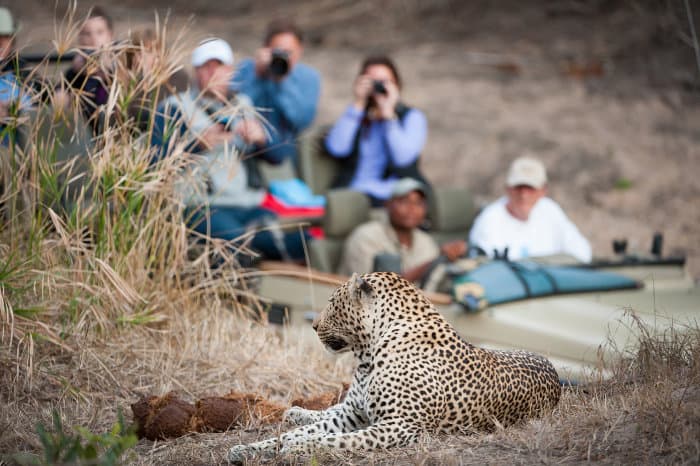
Picture the scene. You’re driving along when the vehicle stops next to an escarpment of dense grass and acacia trees. The safari guide points towards the grass and trees. You look with your eyes. You look with the binoculars. You look and look and can’t see anything other than acacia trees.
Then you see it. A tail flicks. Movement betrays camouflage. A leopard is staring straight at you with piercing blue eyes. And it is far closer than you can imagine.
How did the safari guide know where to stop? How did the safari guide see the leopard?
Our eyes are trained to navigate urban environments. The eyes of a safari guide are trained to find wildlife in the wildest of environments.
Animals like elephants and giraffe are large and conspicuous. It doesn’t take an animal tracking degree to find zebra or wildebeest. But many animals are shy, secretive and solitary.
With a good safari guide you will see more animals. Other vehicles will drive past and you will enjoy intimate moments with wildlife that prefers to hide.
Sometimes it can be confusing. Why have we stopped here? What are we looking for? The safari guide has responded to a single minute clue, a clue that every other guide has missed.
An African safari is unpredictable and nothing like being in a zoo. The better your safari guide the more you can enjoy the unpredictability.
Where to go
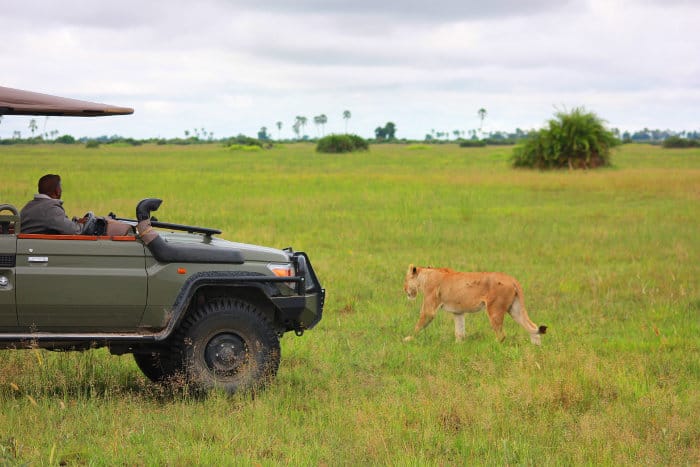
The best city guides will take you off the beaten track, perhaps down a hidden alleyway, or to a cafe that only locals know about. Two guides in Berlin can take you on two completely different routes.
The same is true on safari. Two different safari guides will take you on two different routes through Serengeti National Park or Amboseli National Park. However, route planning is more complex in the wilderness than in the city.
Seasonal changes define most African safari destinations. Not only does a safari guide need to know where to go, they must understand where to go dependent on the time of year.
Part of their role is to chat to other guides and find out where revered animals are hiding. They must also analyse animal movement and make split-second decisions on which way to turn.
A good safari guide will always respond to the wilderness and adapt the route based on animal movement and action. A poor safari guide will follow a signposted route around a park and hope to encounter some animals.
Like a guide in Berlin, a safari guide needs to have an incredible understanding of the destination. Except, things change a lot faster in the wilderness than in the city.
Their knowledge will include the exact location of a wild dog den, the time at which a particular waterhole gets busy with wildlife, the location of a fresh carcass and favourite hangout spot of a lion pride.
As an example, anyone can go to Kruger National Park, drive around, and see a few animals. A good safari guide makes all the difference, because knowing exactly where to go means more wildlife encounters from closer proximity.
How to Find an Exceptional Safari Guide (Before You Travel)
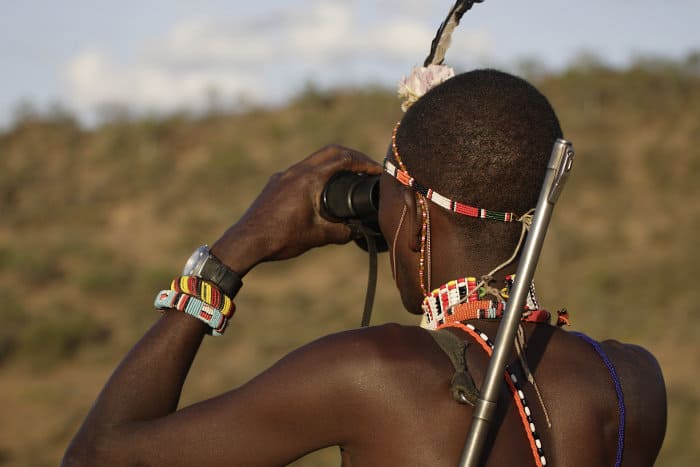
The challenge is the same wherever you are in the world. How do you find a good guide, when you only know quality after you set off on a tour?
Personal Recommendations
Personal recommendations go a long way in the safari industry. Many safari guides work on a freelance basis and operate tours for a variety of safari operators. Most guides also have their own tour company, except they don’t have the time or skills to market their own company.
Personal recommendations are great for an obvious reason – they are a validation of quality from a peer. If you trust the recommendation you can trust the guide.
Recommendations can also mean a much cheaper safari. By booking directly with a safari guide you will remove the tour operator and middle man.
One example is Alfa Mniko, a safari guide in Tanzania. His website is basic and he does no marketing, because he is always guiding a tour. His safaris are cheaper than other tour operators and 98% of his business comes through personal recommendations (editor’s disclaimer – Alfa has guided my family and friends on more than ten safaris).
Timing
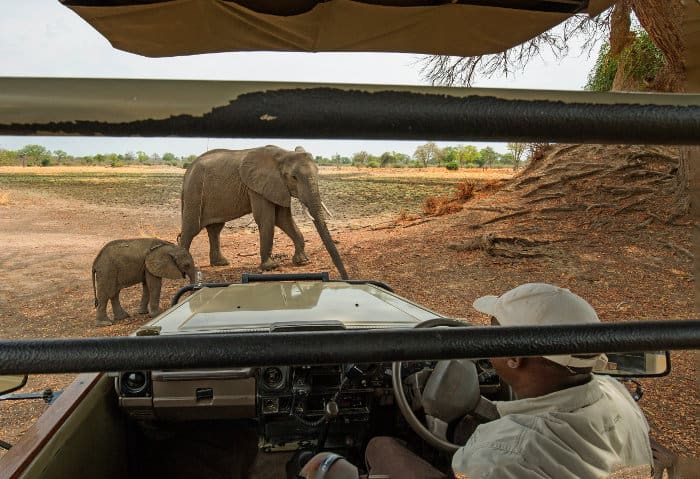
Most guides genuinely want the best experience for their clients, whether in London or the Laikipia Plateau. Other guides just want to get paid and don’t care too much after you’ve paid for the tour.
Most online safari itineraries are the same. They tell you the name of the destination and accommodation for each day.
You can learn more about a company and safari guide by asking questions about timing.
For example, when will the safari guide take you into Ngorongoro Crater for a game drive? Does he want to be on the crater floor at first light? Or will he take you on a morning game drive? Or a game drive in the afternoon?
Ask difficult questions about the animals you want to see as well. For example, what will be the best time to see leopards in your destination? A good safari guide will remind you that encounters are unpredictable but a certain time and place can offer the best chance.
Many safari day trips involve round-trip transportation from a major city and a game drive during the middle of the day, which is the worst time to see animals. So ask the question: will this be the best safari for wildlife encounters?
If the answer is yes then the guide or operator doesn’t care too much about your experience. If the answer is no and the guide recommends a different itinerary, you know that they are not simply trying to make a sale.
Guide recommendations
Some guides want to take you to diamond stores and make a commission. Other guides actually want a good experience. That’s the same in cities and the wilderness, where jewellery stores are surprisingly abundant.
Before traveling, ask different guides for specific recommendations. Asking a question about the best safari destinations in Africa is impossible to answer. So it is best to already have a good idea of your route and destinations before contacting different guides.
Ask specific questions about the time of year and animals you can see. Ask about alterations to the route based on the month or a specific interest in a certain animal. Get the guide to tell you his opinion on two different lodges.
Safari guides will not always have great written English, especially in East Africa. However, you will want to see email responses that show clarity as well as an understanding that goes beyond what you can find on the Internet.
The best safari guides are usually those who recommend something that is different from the norm. For example, you can find thousands of Tanzania Northern Circuit itineraries online. Most of them are a copy and paste job from each other.
A good safari guide will help you see between the lines and make suggestions you are yet to consider.
The price of the safari
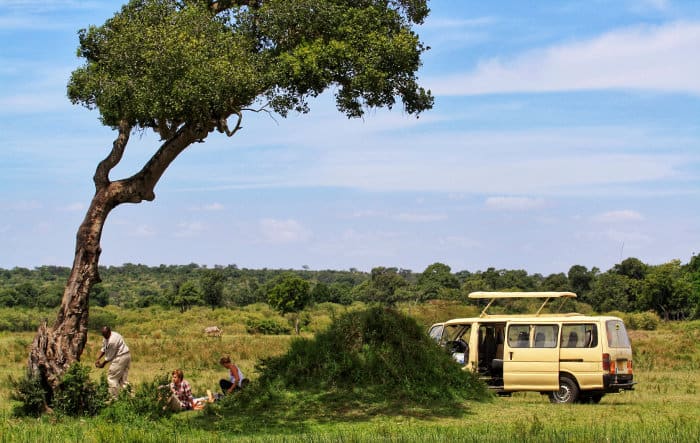
The most experienced safari guides generally work for the most upmarket lodges and safari companies.
Budget safari companies employ the cheapest safari guides. These guides may still be good but won’t have a high level of experience. Guides advance their careers by working for more upmarket operators who attract better paying clients.
Imagine if you are a guide. Would you prefer to guide a couple of penny-pinching backpackers or a couple of wealthy holiday makers staying in USD 1000 per night camps? As much as the backpackers would be easier and more fun, career progression means earning more money for your family.
You cannot expect an experienced guide on a budget bottom safari. However, you should not always expect a great safari guide on an expensive safari. You will still need to ask questions.
How to Get in Contact with a Safari Guide (Before You Travel)
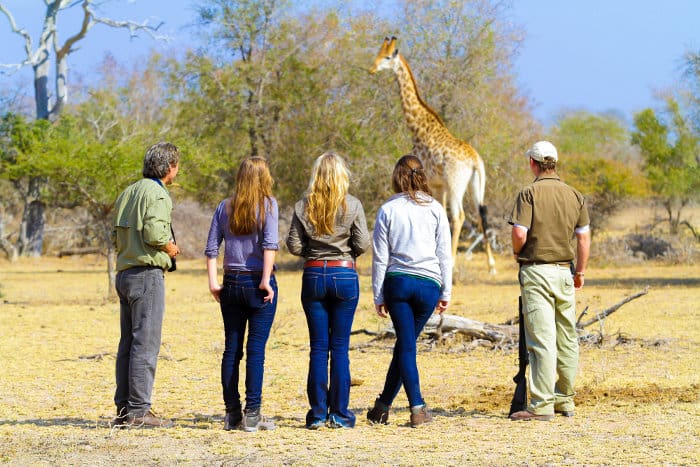
Unfortunately, it can be difficult to gain direct contact with a safari guide. When booking a safari tour you may be in contact with a tour company and a sales agent sitting behind a desk.
It is highly recommended to ask the company specific questions about the guide.
- Where is the safari guide from? Local is better.
- How many years experience does the guide have? Ideally ten plus years. Less than five years is very much a junior guide.
- Can you contact the safari guide directly in advance of the trip?
A tour company may not be able to guarantee a specific guide for your trip. However, by asking three simply questions you can help ensure that the operator uses one of their better or top guides.
Also look through reviews for specific mentions of the guide. Many reviewers will include the name of the guide if they had a good experience.
A Good Safari Guide Makes the Difference
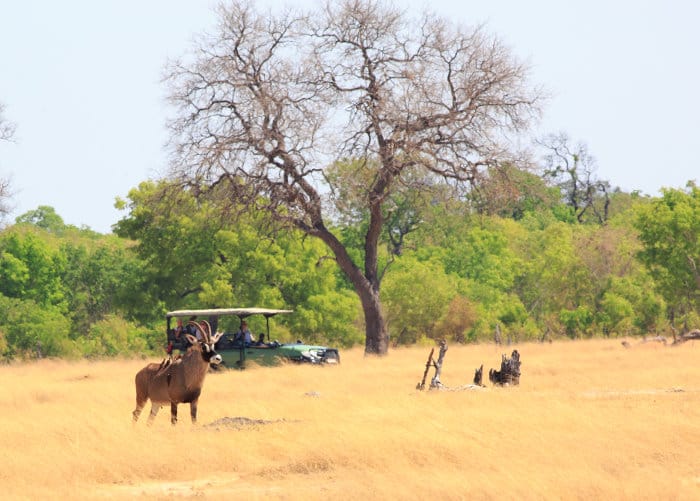
Let’s go back to go forward. A safari guide will make the difference between a good safari and the safari of a lifetime.
Choosing a safari company can be a baffling decision. There are hundreds of different companies and thousands of potential routes.
An African safari is also an expensive holiday. You need to take the time that is necessary to compare companies and safari guides.
First decide on the region you want to visit and a general idea of the destinations you want to explore. These pages can help you.
- South Africa safari
- Botswana safari
- Namibia safari
- Zimbabwe safari
- Zambia safari
- Kenya safari
- Tanzania safari
- Uganda safari
Then come up with a list of questions. Make them specific to the destinations, around timings, guiding, activities and recommendations. Also ask specific questions about your interests, which could be wildlife photography or a certain animal.
Contact around ten different safari companies and don’t just pick those on the first page of Google. Bigger companies have larger marketing budgets and they invest big money on Google visibility. Smaller companies don’t have the time or resources to have flashy websites or visibility, but they will have a cheaper tour.
When analysing the responses you should look for individualised information. Did the guide or operator respond to your question, or did they copy and paste generalised information?
Contact ten companies and guides and you will probably find that the majority of responses are the same. Usually the best safari guide will be the one who answers with something different.
